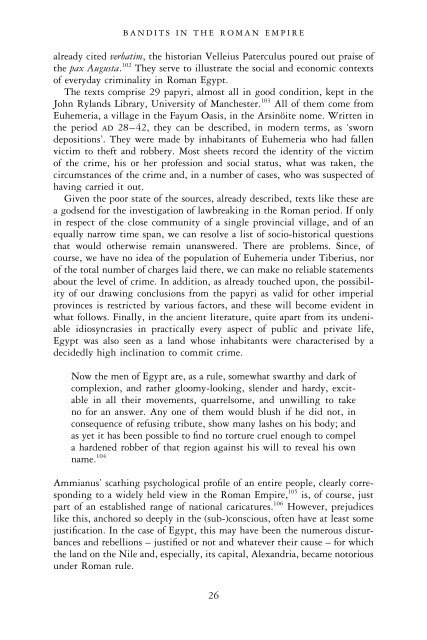You also want an ePaper? Increase the reach of your titles
YUMPU automatically turns print PDFs into web optimized ePapers that Google loves.
BANDITS IN THE ROMAN EMPIRE<br />
already cited verbatim, the historian Velleius Paterculus poured out praise of<br />
the pax Augusta. 102 They serve to illustrate the social and economic contexts<br />
of everyday criminality in Roman Egypt.<br />
The texts comprise 29 papyri, almost all in good condition, kept in the<br />
John Rylands Library, University of Manchester. 103 All of them come from<br />
Euhemeria, a village in the Fayum Oasis, in the Arsinöite nome. Written in<br />
the period ad 28–42, they can be described, in modern terms, as ‘sworn<br />
depositions’. They were made by inhabitants of Euhemeria who had fallen<br />
victim to theft and robbery. Most sheets record the identity of the victim<br />
of the crime, his or her profession and social status, what was taken, the<br />
circumstances of the crime and, in a number of cases, who was suspected of<br />
having carried it out.<br />
Given the poor state of the sources, already described, texts like these are<br />
a godsend for the investigation of lawbreaking in the Roman period. If only<br />
in respect of the close community of a single provincial village, and of an<br />
equally narrow time span, we can resolve a list of socio-historical questions<br />
that would otherwise remain unanswered. There are problems. Since, of<br />
course, we have no idea of the population of Euhemeria under Tiberius, nor<br />
of the total number of charges laid there, we can make no reliable statements<br />
about the level of crime. In addition, as already touched upon, the possibility<br />
of our drawing conclusions from the papyri as valid for other imperial<br />
provinces is restricted by various factors, and these will become evident in<br />
what follows. Finally, in the ancient literature, quite apart from its undeniable<br />
idiosyncrasies in practically every aspect of public and private life,<br />
Egypt was also seen as a land whose inhabitants were characterised by a<br />
decidedly high inclination to commit crime.<br />
Now the men of Egypt are, as a rule, somewhat swarthy and dark of<br />
complexion, and rather gloomy-looking, slender and hardy, excitable<br />
in all their movements, quarrelsome, and unwilling to take<br />
no for an answer. Any one of them would blush if he did not, in<br />
consequence of refusing tribute, show many lashes on his body; and<br />
as yet it has been possible to find no torture cruel enough to compel<br />
a hardened robber of that region against his will to reveal his own<br />
name. 104<br />
Ammianus’ scathing psychological profile of an entire people, clearly corresponding<br />
to a widely held view in the Roman Empire, 105 is, of course, just<br />
part of an established range of national caricatures. 106 However, prejudices<br />
like this, anchored so deeply in the (sub-)conscious, often have at least some<br />
justification. In the case of Egypt, this may have been the numerous disturbances<br />
and rebellions – justified or not and whatever their cause – for which<br />
the land on the Nile and, especially, its capital, Alexandria, became notorious<br />
under Roman rule.<br />
26


